Business Law Report: Acquisition of Rigby Corporate Function Planners
VerifiedAdded on 2022/11/30
|11
|3534
|303
Report
AI Summary
This business law report analyzes the proposed acquisition of Rigby Corporate Function Planners Pty Ltd. by Events Management Ltd. The report, structured as a memorandum to the Departmental Manager, evaluates the terms and conditions of the acquisition, focusing on contract law principles. It examines key elements of contract formation, including intention to create legal relations, offer and acceptance, and consideration. The report also addresses promissory estoppel and collateral contracts. Part B specifically analyzes the case of Masters v Cameron (1954) 91 CLR 353 to determine the enforceability of the agreement. The report applies relevant legal principles and case laws to assess the validity of the contract and explores potential options for enforcing the sale. The ILAC methodology is used to address the hypothetical problem.

BUSINESS LAW REPORT
Paraphrase This Document
Need a fresh take? Get an instant paraphrase of this document with our AI Paraphraser
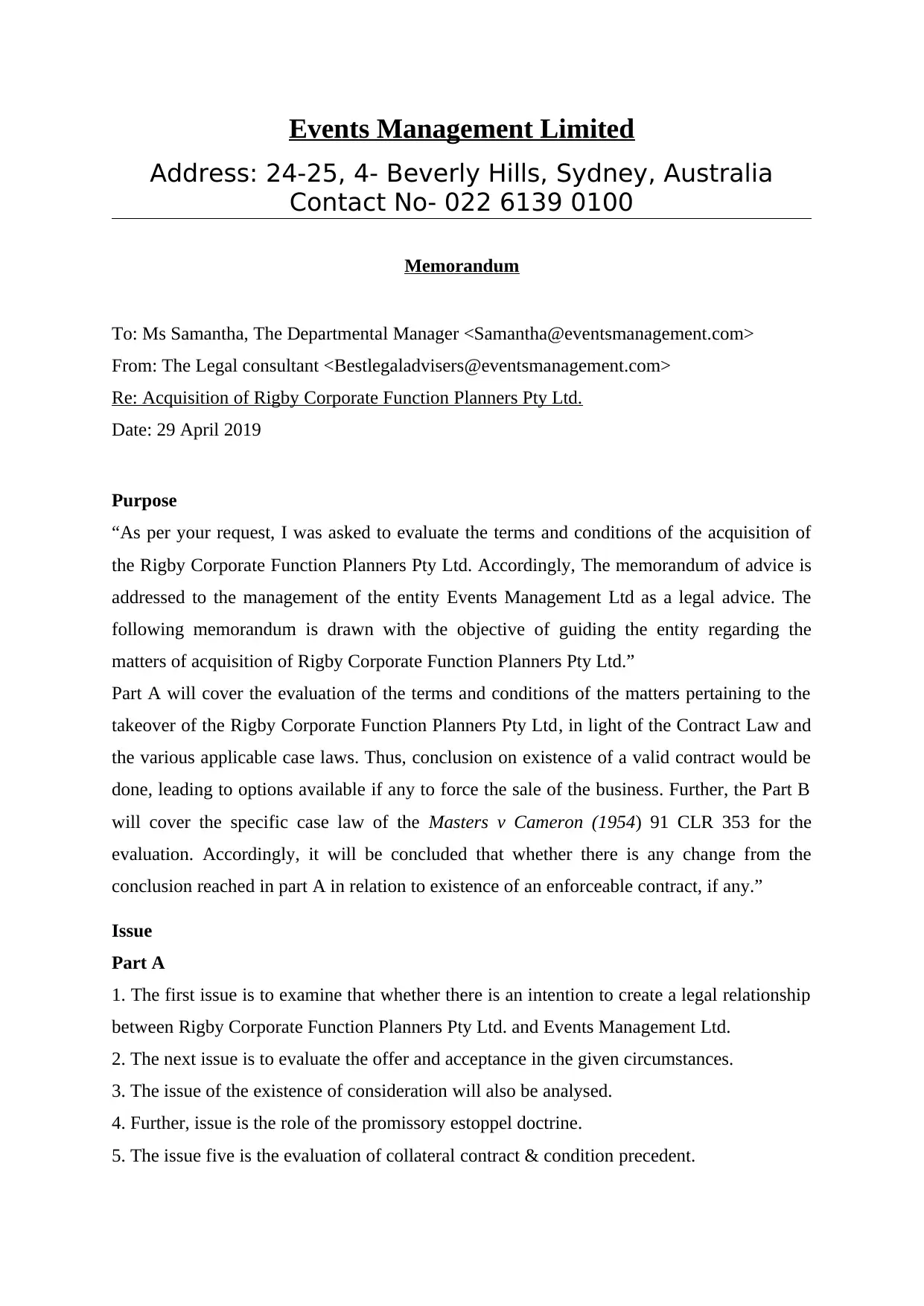
Events Management Limited
Address: 24-25, 4- Beverly Hills, Sydney, Australia
Contact No- 022 6139 0100
Memorandum
To: Ms Samantha, The Departmental Manager <Samantha@eventsmanagement.com>
From: The Legal consultant <Bestlegaladvisers@eventsmanagement.com>
Re: Acquisition of Rigby Corporate Function Planners Pty Ltd.
Date: 29 April 2019
Purpose
“As per your request, I was asked to evaluate the terms and conditions of the acquisition of
the Rigby Corporate Function Planners Pty Ltd. Accordingly, The memorandum of advice is
addressed to the management of the entity Events Management Ltd as a legal advice. The
following memorandum is drawn with the objective of guiding the entity regarding the
matters of acquisition of Rigby Corporate Function Planners Pty Ltd.”
Part A will cover the evaluation of the terms and conditions of the matters pertaining to the
takeover of the Rigby Corporate Function Planners Pty Ltd, in light of the Contract Law and
the various applicable case laws. Thus, conclusion on existence of a valid contract would be
done, leading to options available if any to force the sale of the business. Further, the Part B
will cover the specific case law of the Masters v Cameron (1954) 91 CLR 353 for the
evaluation. Accordingly, it will be concluded that whether there is any change from the
conclusion reached in part A in relation to existence of an enforceable contract, if any.”
Issue
Part A
1. The first issue is to examine that whether there is an intention to create a legal relationship
between Rigby Corporate Function Planners Pty Ltd. and Events Management Ltd.
2. The next issue is to evaluate the offer and acceptance in the given circumstances.
3. The issue of the existence of consideration will also be analysed.
4. Further, issue is the role of the promissory estoppel doctrine.
5. The issue five is the evaluation of collateral contract & condition precedent.
Address: 24-25, 4- Beverly Hills, Sydney, Australia
Contact No- 022 6139 0100
Memorandum
To: Ms Samantha, The Departmental Manager <Samantha@eventsmanagement.com>
From: The Legal consultant <Bestlegaladvisers@eventsmanagement.com>
Re: Acquisition of Rigby Corporate Function Planners Pty Ltd.
Date: 29 April 2019
Purpose
“As per your request, I was asked to evaluate the terms and conditions of the acquisition of
the Rigby Corporate Function Planners Pty Ltd. Accordingly, The memorandum of advice is
addressed to the management of the entity Events Management Ltd as a legal advice. The
following memorandum is drawn with the objective of guiding the entity regarding the
matters of acquisition of Rigby Corporate Function Planners Pty Ltd.”
Part A will cover the evaluation of the terms and conditions of the matters pertaining to the
takeover of the Rigby Corporate Function Planners Pty Ltd, in light of the Contract Law and
the various applicable case laws. Thus, conclusion on existence of a valid contract would be
done, leading to options available if any to force the sale of the business. Further, the Part B
will cover the specific case law of the Masters v Cameron (1954) 91 CLR 353 for the
evaluation. Accordingly, it will be concluded that whether there is any change from the
conclusion reached in part A in relation to existence of an enforceable contract, if any.”
Issue
Part A
1. The first issue is to examine that whether there is an intention to create a legal relationship
between Rigby Corporate Function Planners Pty Ltd. and Events Management Ltd.
2. The next issue is to evaluate the offer and acceptance in the given circumstances.
3. The issue of the existence of consideration will also be analysed.
4. Further, issue is the role of the promissory estoppel doctrine.
5. The issue five is the evaluation of collateral contract & condition precedent.
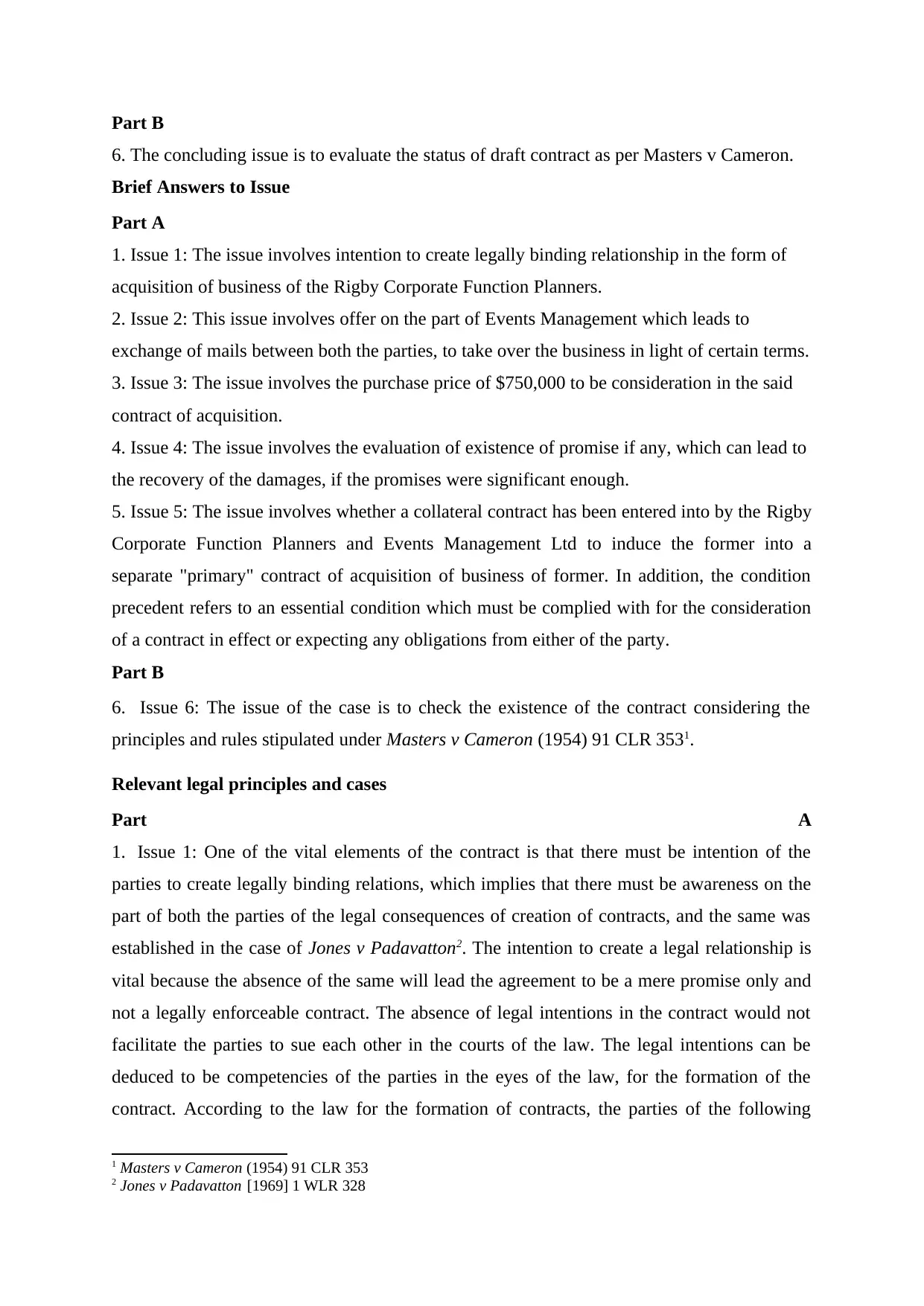
Part B
6. The concluding issue is to evaluate the status of draft contract as per Masters v Cameron.
Brief Answers to Issue
Part A
1. Issue 1: The issue involves intention to create legally binding relationship in the form of
acquisition of business of the Rigby Corporate Function Planners.
2. Issue 2: This issue involves offer on the part of Events Management which leads to
exchange of mails between both the parties, to take over the business in light of certain terms.
3. Issue 3: The issue involves the purchase price of $750,000 to be consideration in the said
contract of acquisition.
4. Issue 4: The issue involves the evaluation of existence of promise if any, which can lead to
the recovery of the damages, if the promises were significant enough.
5. Issue 5: The issue involves whether a collateral contract has been entered into by the Rigby
Corporate Function Planners and Events Management Ltd to induce the former into a
separate "primary" contract of acquisition of business of former. In addition, the condition
precedent refers to an essential condition which must be complied with for the consideration
of a contract in effect or expecting any obligations from either of the party.
Part B
6. Issue 6: The issue of the case is to check the existence of the contract considering the
principles and rules stipulated under Masters v Cameron (1954) 91 CLR 3531.
Relevant legal principles and cases
Part A
1. Issue 1: One of the vital elements of the contract is that there must be intention of the
parties to create legally binding relations, which implies that there must be awareness on the
part of both the parties of the legal consequences of creation of contracts, and the same was
established in the case of Jones v Padavatton2. The intention to create a legal relationship is
vital because the absence of the same will lead the agreement to be a mere promise only and
not a legally enforceable contract. The absence of legal intentions in the contract would not
facilitate the parties to sue each other in the courts of the law. The legal intentions can be
deduced to be competencies of the parties in the eyes of the law, for the formation of the
contract. According to the law for the formation of contracts, the parties of the following
1 Masters v Cameron (1954) 91 CLR 353
2 Jones v Padavatton [1969] 1 WLR 328
6. The concluding issue is to evaluate the status of draft contract as per Masters v Cameron.
Brief Answers to Issue
Part A
1. Issue 1: The issue involves intention to create legally binding relationship in the form of
acquisition of business of the Rigby Corporate Function Planners.
2. Issue 2: This issue involves offer on the part of Events Management which leads to
exchange of mails between both the parties, to take over the business in light of certain terms.
3. Issue 3: The issue involves the purchase price of $750,000 to be consideration in the said
contract of acquisition.
4. Issue 4: The issue involves the evaluation of existence of promise if any, which can lead to
the recovery of the damages, if the promises were significant enough.
5. Issue 5: The issue involves whether a collateral contract has been entered into by the Rigby
Corporate Function Planners and Events Management Ltd to induce the former into a
separate "primary" contract of acquisition of business of former. In addition, the condition
precedent refers to an essential condition which must be complied with for the consideration
of a contract in effect or expecting any obligations from either of the party.
Part B
6. Issue 6: The issue of the case is to check the existence of the contract considering the
principles and rules stipulated under Masters v Cameron (1954) 91 CLR 3531.
Relevant legal principles and cases
Part A
1. Issue 1: One of the vital elements of the contract is that there must be intention of the
parties to create legally binding relations, which implies that there must be awareness on the
part of both the parties of the legal consequences of creation of contracts, and the same was
established in the case of Jones v Padavatton2. The intention to create a legal relationship is
vital because the absence of the same will lead the agreement to be a mere promise only and
not a legally enforceable contract. The absence of legal intentions in the contract would not
facilitate the parties to sue each other in the courts of the law. The legal intentions can be
deduced to be competencies of the parties in the eyes of the law, for the formation of the
contract. According to the law for the formation of contracts, the parties of the following
1 Masters v Cameron (1954) 91 CLR 353
2 Jones v Padavatton [1969] 1 WLR 328
⊘ This is a preview!⊘
Do you want full access?
Subscribe today to unlock all pages.

Trusted by 1+ million students worldwide
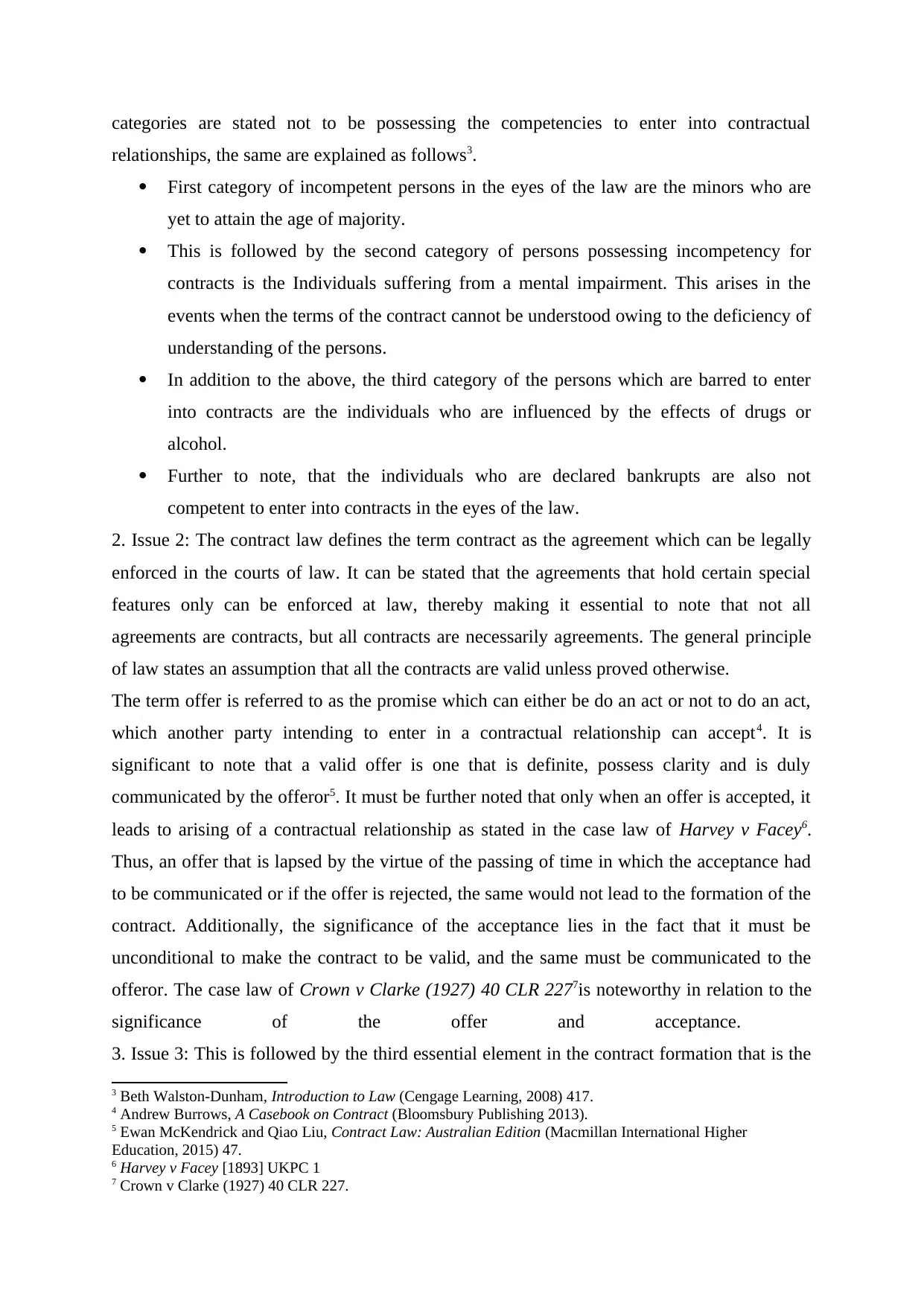
categories are stated not to be possessing the competencies to enter into contractual
relationships, the same are explained as follows3.
First category of incompetent persons in the eyes of the law are the minors who are
yet to attain the age of majority.
This is followed by the second category of persons possessing incompetency for
contracts is the Individuals suffering from a mental impairment. This arises in the
events when the terms of the contract cannot be understood owing to the deficiency of
understanding of the persons.
In addition to the above, the third category of the persons which are barred to enter
into contracts are the individuals who are influenced by the effects of drugs or
alcohol.
Further to note, that the individuals who are declared bankrupts are also not
competent to enter into contracts in the eyes of the law.
2. Issue 2: The contract law defines the term contract as the agreement which can be legally
enforced in the courts of law. It can be stated that the agreements that hold certain special
features only can be enforced at law, thereby making it essential to note that not all
agreements are contracts, but all contracts are necessarily agreements. The general principle
of law states an assumption that all the contracts are valid unless proved otherwise.
The term offer is referred to as the promise which can either be do an act or not to do an act,
which another party intending to enter in a contractual relationship can accept4. It is
significant to note that a valid offer is one that is definite, possess clarity and is duly
communicated by the offeror5. It must be further noted that only when an offer is accepted, it
leads to arising of a contractual relationship as stated in the case law of Harvey v Facey6.
Thus, an offer that is lapsed by the virtue of the passing of time in which the acceptance had
to be communicated or if the offer is rejected, the same would not lead to the formation of the
contract. Additionally, the significance of the acceptance lies in the fact that it must be
unconditional to make the contract to be valid, and the same must be communicated to the
offeror. The case law of Crown v Clarke (1927) 40 CLR 2277is noteworthy in relation to the
significance of the offer and acceptance.
3. Issue 3: This is followed by the third essential element in the contract formation that is the
3 Beth Walston-Dunham, Introduction to Law (Cengage Learning, 2008) 417.
4 Andrew Burrows, A Casebook on Contract (Bloomsbury Publishing 2013).
5 Ewan McKendrick and Qiao Liu, Contract Law: Australian Edition (Macmillan International Higher
Education, 2015) 47.
6 Harvey v Facey [1893] UKPC 1
7 Crown v Clarke (1927) 40 CLR 227.
relationships, the same are explained as follows3.
First category of incompetent persons in the eyes of the law are the minors who are
yet to attain the age of majority.
This is followed by the second category of persons possessing incompetency for
contracts is the Individuals suffering from a mental impairment. This arises in the
events when the terms of the contract cannot be understood owing to the deficiency of
understanding of the persons.
In addition to the above, the third category of the persons which are barred to enter
into contracts are the individuals who are influenced by the effects of drugs or
alcohol.
Further to note, that the individuals who are declared bankrupts are also not
competent to enter into contracts in the eyes of the law.
2. Issue 2: The contract law defines the term contract as the agreement which can be legally
enforced in the courts of law. It can be stated that the agreements that hold certain special
features only can be enforced at law, thereby making it essential to note that not all
agreements are contracts, but all contracts are necessarily agreements. The general principle
of law states an assumption that all the contracts are valid unless proved otherwise.
The term offer is referred to as the promise which can either be do an act or not to do an act,
which another party intending to enter in a contractual relationship can accept4. It is
significant to note that a valid offer is one that is definite, possess clarity and is duly
communicated by the offeror5. It must be further noted that only when an offer is accepted, it
leads to arising of a contractual relationship as stated in the case law of Harvey v Facey6.
Thus, an offer that is lapsed by the virtue of the passing of time in which the acceptance had
to be communicated or if the offer is rejected, the same would not lead to the formation of the
contract. Additionally, the significance of the acceptance lies in the fact that it must be
unconditional to make the contract to be valid, and the same must be communicated to the
offeror. The case law of Crown v Clarke (1927) 40 CLR 2277is noteworthy in relation to the
significance of the offer and acceptance.
3. Issue 3: This is followed by the third essential element in the contract formation that is the
3 Beth Walston-Dunham, Introduction to Law (Cengage Learning, 2008) 417.
4 Andrew Burrows, A Casebook on Contract (Bloomsbury Publishing 2013).
5 Ewan McKendrick and Qiao Liu, Contract Law: Australian Edition (Macmillan International Higher
Education, 2015) 47.
6 Harvey v Facey [1893] UKPC 1
7 Crown v Clarke (1927) 40 CLR 227.
Paraphrase This Document
Need a fresh take? Get an instant paraphrase of this document with our AI Paraphraser
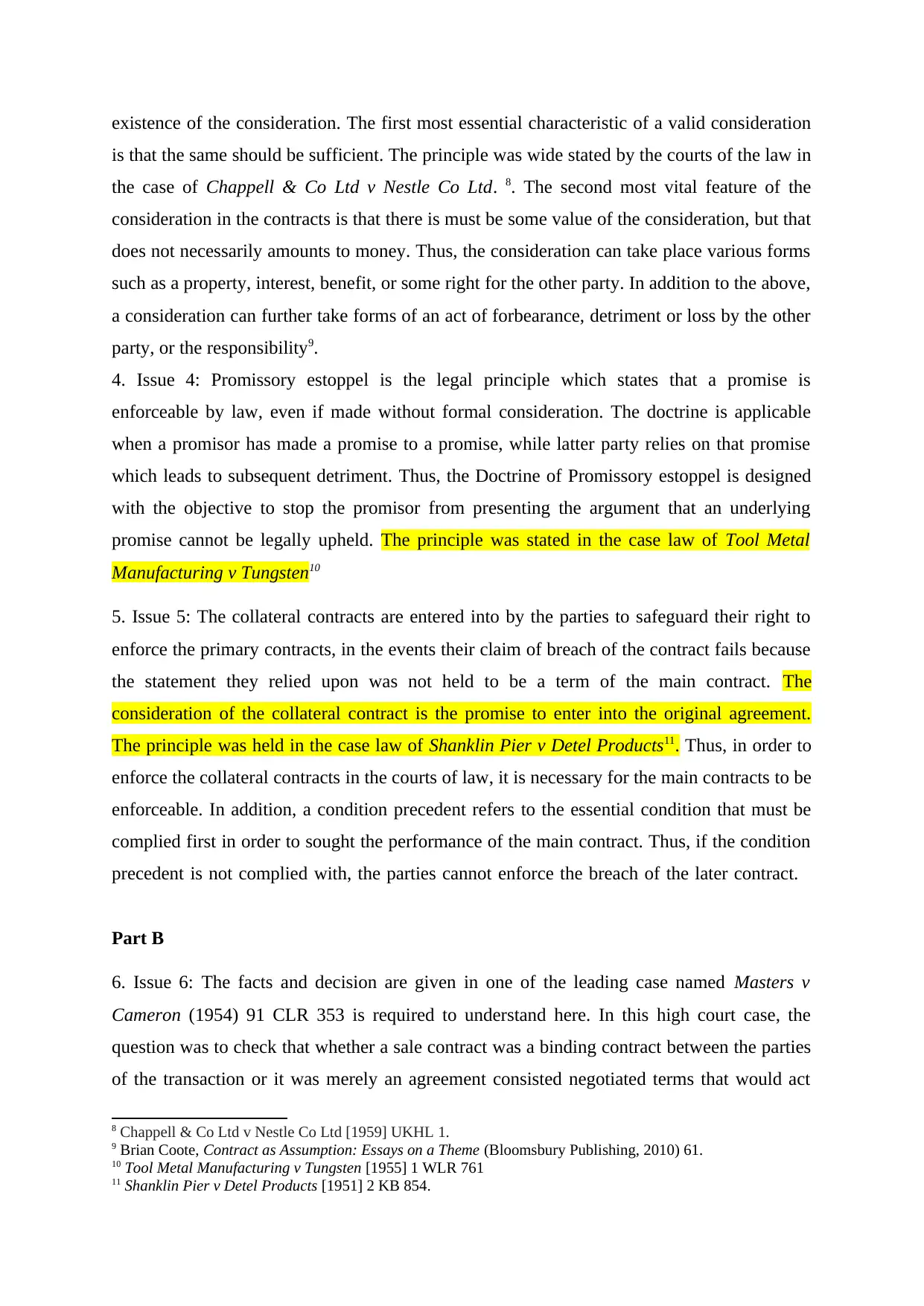
existence of the consideration. The first most essential characteristic of a valid consideration
is that the same should be sufficient. The principle was wide stated by the courts of the law in
the case of Chappell & Co Ltd v Nestle Co Ltd. 8. The second most vital feature of the
consideration in the contracts is that there is must be some value of the consideration, but that
does not necessarily amounts to money. Thus, the consideration can take place various forms
such as a property, interest, benefit, or some right for the other party. In addition to the above,
a consideration can further take forms of an act of forbearance, detriment or loss by the other
party, or the responsibility9.
4. Issue 4: Promissory estoppel is the legal principle which states that a promise is
enforceable by law, even if made without formal consideration. The doctrine is applicable
when a promisor has made a promise to a promise, while latter party relies on that promise
which leads to subsequent detriment. Thus, the Doctrine of Promissory estoppel is designed
with the objective to stop the promisor from presenting the argument that an underlying
promise cannot be legally upheld. The principle was stated in the case law of Tool Metal
Manufacturing v Tungsten10
5. Issue 5: The collateral contracts are entered into by the parties to safeguard their right to
enforce the primary contracts, in the events their claim of breach of the contract fails because
the statement they relied upon was not held to be a term of the main contract. The
consideration of the collateral contract is the promise to enter into the original agreement.
The principle was held in the case law of Shanklin Pier v Detel Products11. Thus, in order to
enforce the collateral contracts in the courts of law, it is necessary for the main contracts to be
enforceable. In addition, a condition precedent refers to the essential condition that must be
complied first in order to sought the performance of the main contract. Thus, if the condition
precedent is not complied with, the parties cannot enforce the breach of the later contract.
Part B
6. Issue 6: The facts and decision are given in one of the leading case named Masters v
Cameron (1954) 91 CLR 353 is required to understand here. In this high court case, the
question was to check that whether a sale contract was a binding contract between the parties
of the transaction or it was merely an agreement consisted negotiated terms that would act
8 Chappell & Co Ltd v Nestle Co Ltd [1959] UKHL 1.
9 Brian Coote, Contract as Assumption: Essays on a Theme (Bloomsbury Publishing, 2010) 61.
10 Tool Metal Manufacturing v Tungsten [1955] 1 WLR 761
11 Shanklin Pier v Detel Products [1951] 2 KB 854.
is that the same should be sufficient. The principle was wide stated by the courts of the law in
the case of Chappell & Co Ltd v Nestle Co Ltd. 8. The second most vital feature of the
consideration in the contracts is that there is must be some value of the consideration, but that
does not necessarily amounts to money. Thus, the consideration can take place various forms
such as a property, interest, benefit, or some right for the other party. In addition to the above,
a consideration can further take forms of an act of forbearance, detriment or loss by the other
party, or the responsibility9.
4. Issue 4: Promissory estoppel is the legal principle which states that a promise is
enforceable by law, even if made without formal consideration. The doctrine is applicable
when a promisor has made a promise to a promise, while latter party relies on that promise
which leads to subsequent detriment. Thus, the Doctrine of Promissory estoppel is designed
with the objective to stop the promisor from presenting the argument that an underlying
promise cannot be legally upheld. The principle was stated in the case law of Tool Metal
Manufacturing v Tungsten10
5. Issue 5: The collateral contracts are entered into by the parties to safeguard their right to
enforce the primary contracts, in the events their claim of breach of the contract fails because
the statement they relied upon was not held to be a term of the main contract. The
consideration of the collateral contract is the promise to enter into the original agreement.
The principle was held in the case law of Shanklin Pier v Detel Products11. Thus, in order to
enforce the collateral contracts in the courts of law, it is necessary for the main contracts to be
enforceable. In addition, a condition precedent refers to the essential condition that must be
complied first in order to sought the performance of the main contract. Thus, if the condition
precedent is not complied with, the parties cannot enforce the breach of the later contract.
Part B
6. Issue 6: The facts and decision are given in one of the leading case named Masters v
Cameron (1954) 91 CLR 353 is required to understand here. In this high court case, the
question was to check that whether a sale contract was a binding contract between the parties
of the transaction or it was merely an agreement consisted negotiated terms that would act
8 Chappell & Co Ltd v Nestle Co Ltd [1959] UKHL 1.
9 Brian Coote, Contract as Assumption: Essays on a Theme (Bloomsbury Publishing, 2010) 61.
10 Tool Metal Manufacturing v Tungsten [1955] 1 WLR 761
11 Shanklin Pier v Detel Products [1951] 2 KB 854.
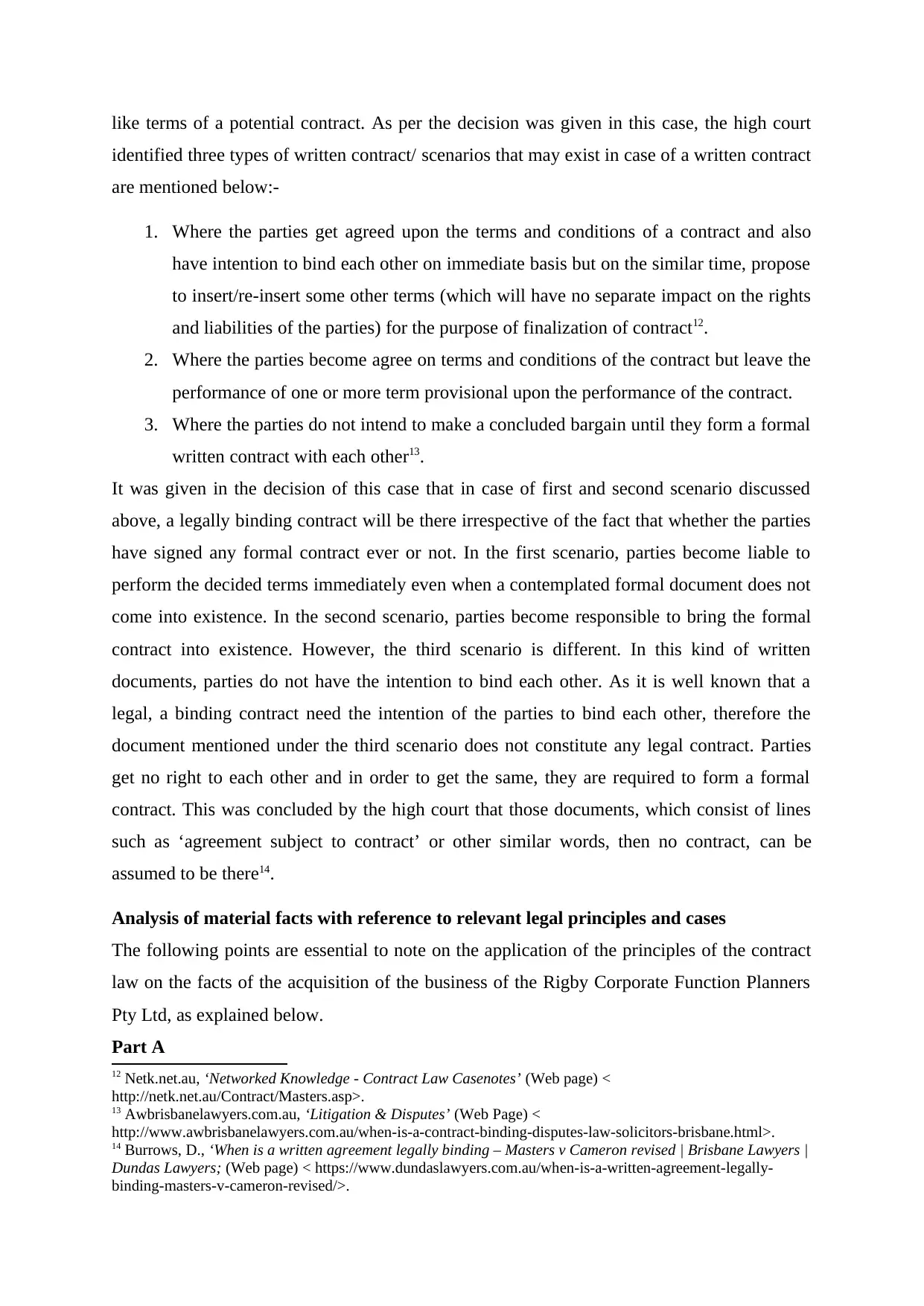
like terms of a potential contract. As per the decision was given in this case, the high court
identified three types of written contract/ scenarios that may exist in case of a written contract
are mentioned below:-
1. Where the parties get agreed upon the terms and conditions of a contract and also
have intention to bind each other on immediate basis but on the similar time, propose
to insert/re-insert some other terms (which will have no separate impact on the rights
and liabilities of the parties) for the purpose of finalization of contract12.
2. Where the parties become agree on terms and conditions of the contract but leave the
performance of one or more term provisional upon the performance of the contract.
3. Where the parties do not intend to make a concluded bargain until they form a formal
written contract with each other13.
It was given in the decision of this case that in case of first and second scenario discussed
above, a legally binding contract will be there irrespective of the fact that whether the parties
have signed any formal contract ever or not. In the first scenario, parties become liable to
perform the decided terms immediately even when a contemplated formal document does not
come into existence. In the second scenario, parties become responsible to bring the formal
contract into existence. However, the third scenario is different. In this kind of written
documents, parties do not have the intention to bind each other. As it is well known that a
legal, a binding contract need the intention of the parties to bind each other, therefore the
document mentioned under the third scenario does not constitute any legal contract. Parties
get no right to each other and in order to get the same, they are required to form a formal
contract. This was concluded by the high court that those documents, which consist of lines
such as ‘agreement subject to contract’ or other similar words, then no contract, can be
assumed to be there14.
Analysis of material facts with reference to relevant legal principles and cases
The following points are essential to note on the application of the principles of the contract
law on the facts of the acquisition of the business of the Rigby Corporate Function Planners
Pty Ltd, as explained below.
Part A
12 Netk.net.au, ‘Networked Knowledge - Contract Law Casenotes’ (Web page) <
http://netk.net.au/Contract/Masters.asp>.
13 Awbrisbanelawyers.com.au, ‘Litigation & Disputes’ (Web Page) <
http://www.awbrisbanelawyers.com.au/when-is-a-contract-binding-disputes-law-solicitors-brisbane.html>.
14 Burrows, D., ‘When is a written agreement legally binding – Masters v Cameron revised | Brisbane Lawyers |
Dundas Lawyers; (Web page) < https://www.dundaslawyers.com.au/when-is-a-written-agreement-legally-
binding-masters-v-cameron-revised/>.
identified three types of written contract/ scenarios that may exist in case of a written contract
are mentioned below:-
1. Where the parties get agreed upon the terms and conditions of a contract and also
have intention to bind each other on immediate basis but on the similar time, propose
to insert/re-insert some other terms (which will have no separate impact on the rights
and liabilities of the parties) for the purpose of finalization of contract12.
2. Where the parties become agree on terms and conditions of the contract but leave the
performance of one or more term provisional upon the performance of the contract.
3. Where the parties do not intend to make a concluded bargain until they form a formal
written contract with each other13.
It was given in the decision of this case that in case of first and second scenario discussed
above, a legally binding contract will be there irrespective of the fact that whether the parties
have signed any formal contract ever or not. In the first scenario, parties become liable to
perform the decided terms immediately even when a contemplated formal document does not
come into existence. In the second scenario, parties become responsible to bring the formal
contract into existence. However, the third scenario is different. In this kind of written
documents, parties do not have the intention to bind each other. As it is well known that a
legal, a binding contract need the intention of the parties to bind each other, therefore the
document mentioned under the third scenario does not constitute any legal contract. Parties
get no right to each other and in order to get the same, they are required to form a formal
contract. This was concluded by the high court that those documents, which consist of lines
such as ‘agreement subject to contract’ or other similar words, then no contract, can be
assumed to be there14.
Analysis of material facts with reference to relevant legal principles and cases
The following points are essential to note on the application of the principles of the contract
law on the facts of the acquisition of the business of the Rigby Corporate Function Planners
Pty Ltd, as explained below.
Part A
12 Netk.net.au, ‘Networked Knowledge - Contract Law Casenotes’ (Web page) <
http://netk.net.au/Contract/Masters.asp>.
13 Awbrisbanelawyers.com.au, ‘Litigation & Disputes’ (Web Page) <
http://www.awbrisbanelawyers.com.au/when-is-a-contract-binding-disputes-law-solicitors-brisbane.html>.
14 Burrows, D., ‘When is a written agreement legally binding – Masters v Cameron revised | Brisbane Lawyers |
Dundas Lawyers; (Web page) < https://www.dundaslawyers.com.au/when-is-a-written-agreement-legally-
binding-masters-v-cameron-revised/>.
⊘ This is a preview!⊘
Do you want full access?
Subscribe today to unlock all pages.

Trusted by 1+ million students worldwide
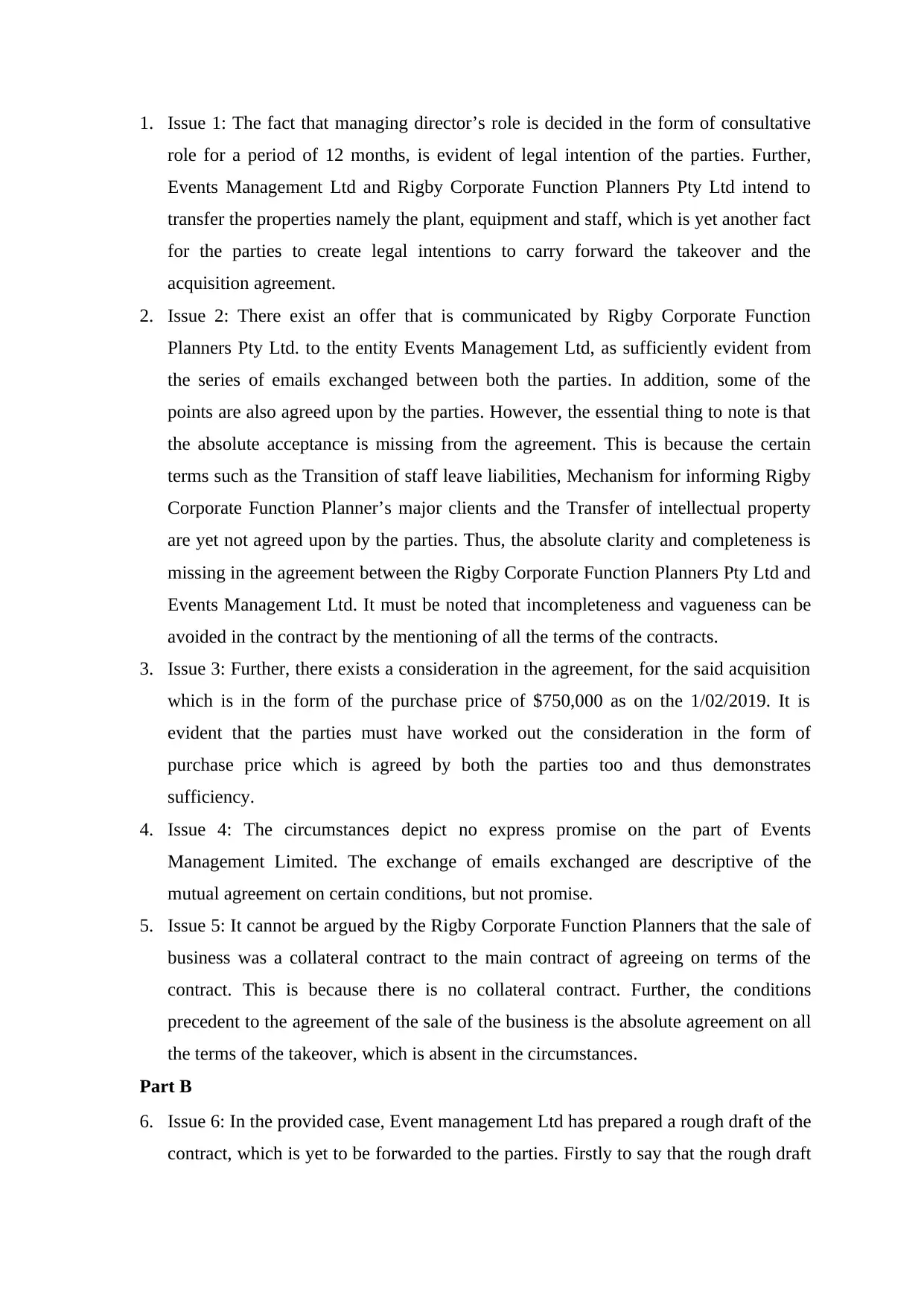
1. Issue 1: The fact that managing director’s role is decided in the form of consultative
role for a period of 12 months, is evident of legal intention of the parties. Further,
Events Management Ltd and Rigby Corporate Function Planners Pty Ltd intend to
transfer the properties namely the plant, equipment and staff, which is yet another fact
for the parties to create legal intentions to carry forward the takeover and the
acquisition agreement.
2. Issue 2: There exist an offer that is communicated by Rigby Corporate Function
Planners Pty Ltd. to the entity Events Management Ltd, as sufficiently evident from
the series of emails exchanged between both the parties. In addition, some of the
points are also agreed upon by the parties. However, the essential thing to note is that
the absolute acceptance is missing from the agreement. This is because the certain
terms such as the Transition of staff leave liabilities, Mechanism for informing Rigby
Corporate Function Planner’s major clients and the Transfer of intellectual property
are yet not agreed upon by the parties. Thus, the absolute clarity and completeness is
missing in the agreement between the Rigby Corporate Function Planners Pty Ltd and
Events Management Ltd. It must be noted that incompleteness and vagueness can be
avoided in the contract by the mentioning of all the terms of the contracts.
3. Issue 3: Further, there exists a consideration in the agreement, for the said acquisition
which is in the form of the purchase price of $750,000 as on the 1/02/2019. It is
evident that the parties must have worked out the consideration in the form of
purchase price which is agreed by both the parties too and thus demonstrates
sufficiency.
4. Issue 4: The circumstances depict no express promise on the part of Events
Management Limited. The exchange of emails exchanged are descriptive of the
mutual agreement on certain conditions, but not promise.
5. Issue 5: It cannot be argued by the Rigby Corporate Function Planners that the sale of
business was a collateral contract to the main contract of agreeing on terms of the
contract. This is because there is no collateral contract. Further, the conditions
precedent to the agreement of the sale of the business is the absolute agreement on all
the terms of the takeover, which is absent in the circumstances.
Part B
6. Issue 6: In the provided case, Event management Ltd has prepared a rough draft of the
contract, which is yet to be forwarded to the parties. Firstly to say that the rough draft
role for a period of 12 months, is evident of legal intention of the parties. Further,
Events Management Ltd and Rigby Corporate Function Planners Pty Ltd intend to
transfer the properties namely the plant, equipment and staff, which is yet another fact
for the parties to create legal intentions to carry forward the takeover and the
acquisition agreement.
2. Issue 2: There exist an offer that is communicated by Rigby Corporate Function
Planners Pty Ltd. to the entity Events Management Ltd, as sufficiently evident from
the series of emails exchanged between both the parties. In addition, some of the
points are also agreed upon by the parties. However, the essential thing to note is that
the absolute acceptance is missing from the agreement. This is because the certain
terms such as the Transition of staff leave liabilities, Mechanism for informing Rigby
Corporate Function Planner’s major clients and the Transfer of intellectual property
are yet not agreed upon by the parties. Thus, the absolute clarity and completeness is
missing in the agreement between the Rigby Corporate Function Planners Pty Ltd and
Events Management Ltd. It must be noted that incompleteness and vagueness can be
avoided in the contract by the mentioning of all the terms of the contracts.
3. Issue 3: Further, there exists a consideration in the agreement, for the said acquisition
which is in the form of the purchase price of $750,000 as on the 1/02/2019. It is
evident that the parties must have worked out the consideration in the form of
purchase price which is agreed by both the parties too and thus demonstrates
sufficiency.
4. Issue 4: The circumstances depict no express promise on the part of Events
Management Limited. The exchange of emails exchanged are descriptive of the
mutual agreement on certain conditions, but not promise.
5. Issue 5: It cannot be argued by the Rigby Corporate Function Planners that the sale of
business was a collateral contract to the main contract of agreeing on terms of the
contract. This is because there is no collateral contract. Further, the conditions
precedent to the agreement of the sale of the business is the absolute agreement on all
the terms of the takeover, which is absent in the circumstances.
Part B
6. Issue 6: In the provided case, Event management Ltd has prepared a rough draft of the
contract, which is yet to be forwarded to the parties. Firstly to say that the rough draft
Paraphrase This Document
Need a fresh take? Get an instant paraphrase of this document with our AI Paraphraser
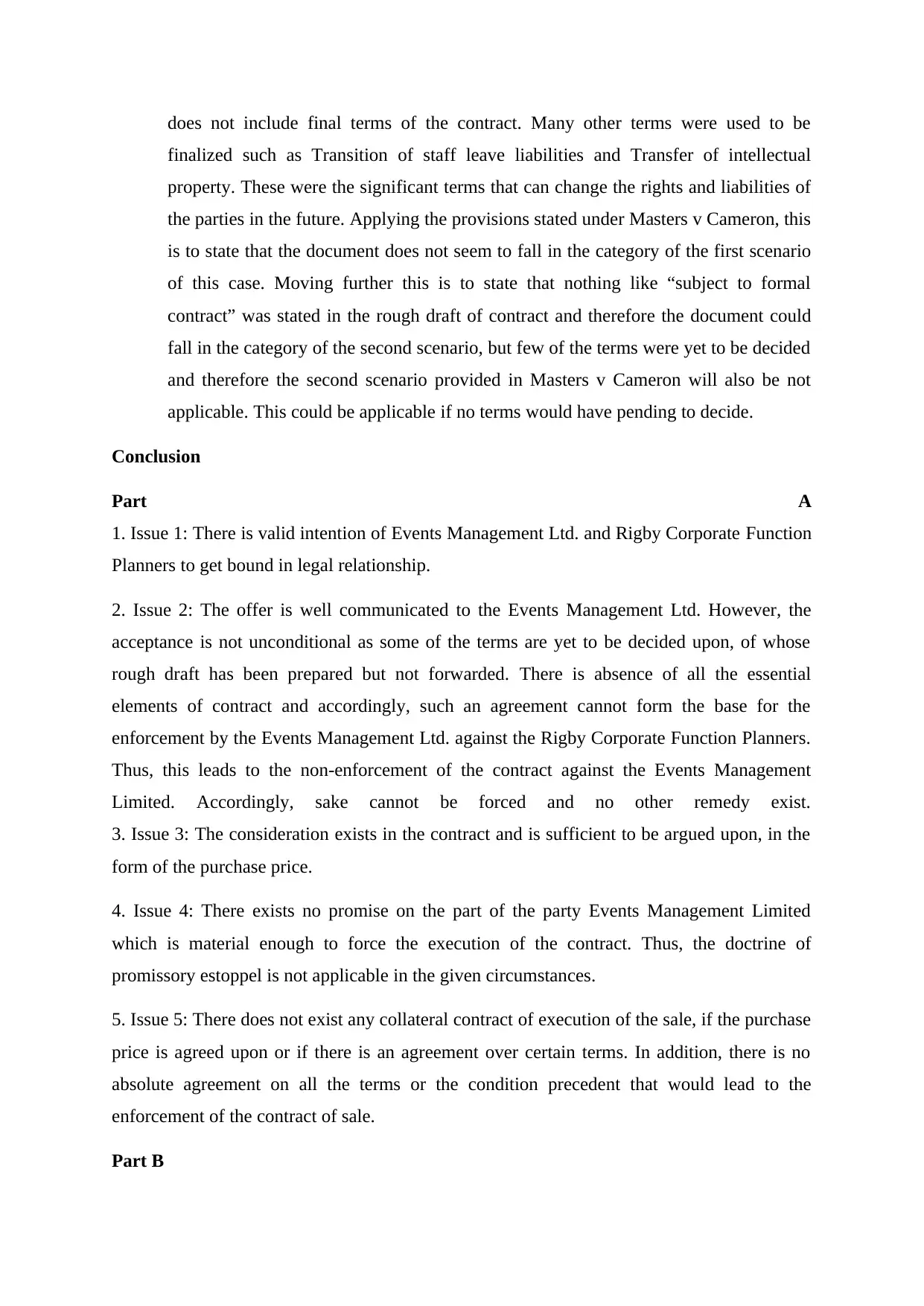
does not include final terms of the contract. Many other terms were used to be
finalized such as Transition of staff leave liabilities and Transfer of intellectual
property. These were the significant terms that can change the rights and liabilities of
the parties in the future. Applying the provisions stated under Masters v Cameron, this
is to state that the document does not seem to fall in the category of the first scenario
of this case. Moving further this is to state that nothing like “subject to formal
contract” was stated in the rough draft of contract and therefore the document could
fall in the category of the second scenario, but few of the terms were yet to be decided
and therefore the second scenario provided in Masters v Cameron will also be not
applicable. This could be applicable if no terms would have pending to decide.
Conclusion
Part A
1. Issue 1: There is valid intention of Events Management Ltd. and Rigby Corporate Function
Planners to get bound in legal relationship.
2. Issue 2: The offer is well communicated to the Events Management Ltd. However, the
acceptance is not unconditional as some of the terms are yet to be decided upon, of whose
rough draft has been prepared but not forwarded. There is absence of all the essential
elements of contract and accordingly, such an agreement cannot form the base for the
enforcement by the Events Management Ltd. against the Rigby Corporate Function Planners.
Thus, this leads to the non-enforcement of the contract against the Events Management
Limited. Accordingly, sake cannot be forced and no other remedy exist.
3. Issue 3: The consideration exists in the contract and is sufficient to be argued upon, in the
form of the purchase price.
4. Issue 4: There exists no promise on the part of the party Events Management Limited
which is material enough to force the execution of the contract. Thus, the doctrine of
promissory estoppel is not applicable in the given circumstances.
5. Issue 5: There does not exist any collateral contract of execution of the sale, if the purchase
price is agreed upon or if there is an agreement over certain terms. In addition, there is no
absolute agreement on all the terms or the condition precedent that would lead to the
enforcement of the contract of sale.
Part B
finalized such as Transition of staff leave liabilities and Transfer of intellectual
property. These were the significant terms that can change the rights and liabilities of
the parties in the future. Applying the provisions stated under Masters v Cameron, this
is to state that the document does not seem to fall in the category of the first scenario
of this case. Moving further this is to state that nothing like “subject to formal
contract” was stated in the rough draft of contract and therefore the document could
fall in the category of the second scenario, but few of the terms were yet to be decided
and therefore the second scenario provided in Masters v Cameron will also be not
applicable. This could be applicable if no terms would have pending to decide.
Conclusion
Part A
1. Issue 1: There is valid intention of Events Management Ltd. and Rigby Corporate Function
Planners to get bound in legal relationship.
2. Issue 2: The offer is well communicated to the Events Management Ltd. However, the
acceptance is not unconditional as some of the terms are yet to be decided upon, of whose
rough draft has been prepared but not forwarded. There is absence of all the essential
elements of contract and accordingly, such an agreement cannot form the base for the
enforcement by the Events Management Ltd. against the Rigby Corporate Function Planners.
Thus, this leads to the non-enforcement of the contract against the Events Management
Limited. Accordingly, sake cannot be forced and no other remedy exist.
3. Issue 3: The consideration exists in the contract and is sufficient to be argued upon, in the
form of the purchase price.
4. Issue 4: There exists no promise on the part of the party Events Management Limited
which is material enough to force the execution of the contract. Thus, the doctrine of
promissory estoppel is not applicable in the given circumstances.
5. Issue 5: There does not exist any collateral contract of execution of the sale, if the purchase
price is agreed upon or if there is an agreement over certain terms. In addition, there is no
absolute agreement on all the terms or the condition precedent that would lead to the
enforcement of the contract of sale.
Part B
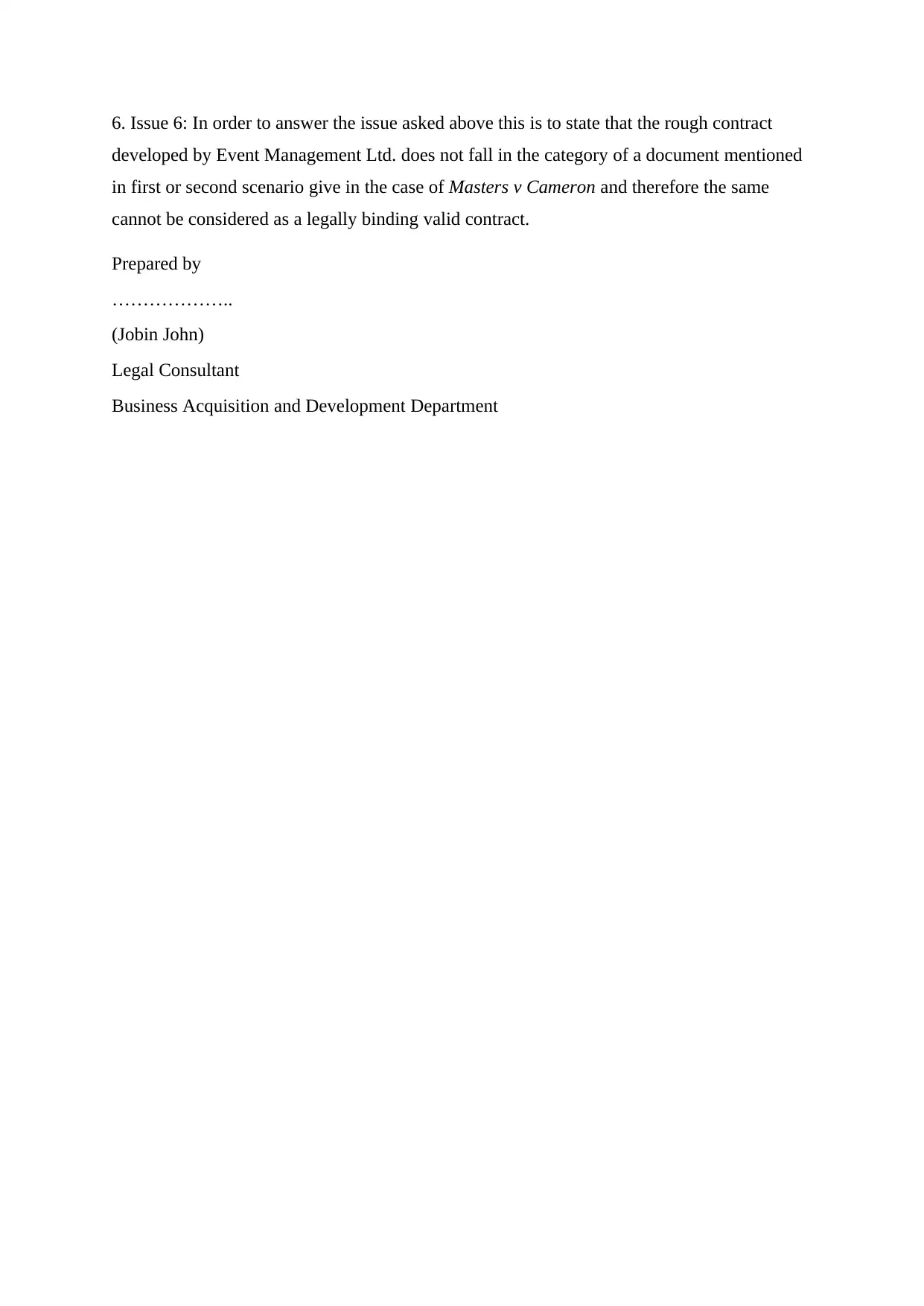
6. Issue 6: In order to answer the issue asked above this is to state that the rough contract
developed by Event Management Ltd. does not fall in the category of a document mentioned
in first or second scenario give in the case of Masters v Cameron and therefore the same
cannot be considered as a legally binding valid contract.
Prepared by
………………..
(Jobin John)
Legal Consultant
Business Acquisition and Development Department
developed by Event Management Ltd. does not fall in the category of a document mentioned
in first or second scenario give in the case of Masters v Cameron and therefore the same
cannot be considered as a legally binding valid contract.
Prepared by
………………..
(Jobin John)
Legal Consultant
Business Acquisition and Development Department
⊘ This is a preview!⊘
Do you want full access?
Subscribe today to unlock all pages.

Trusted by 1+ million students worldwide
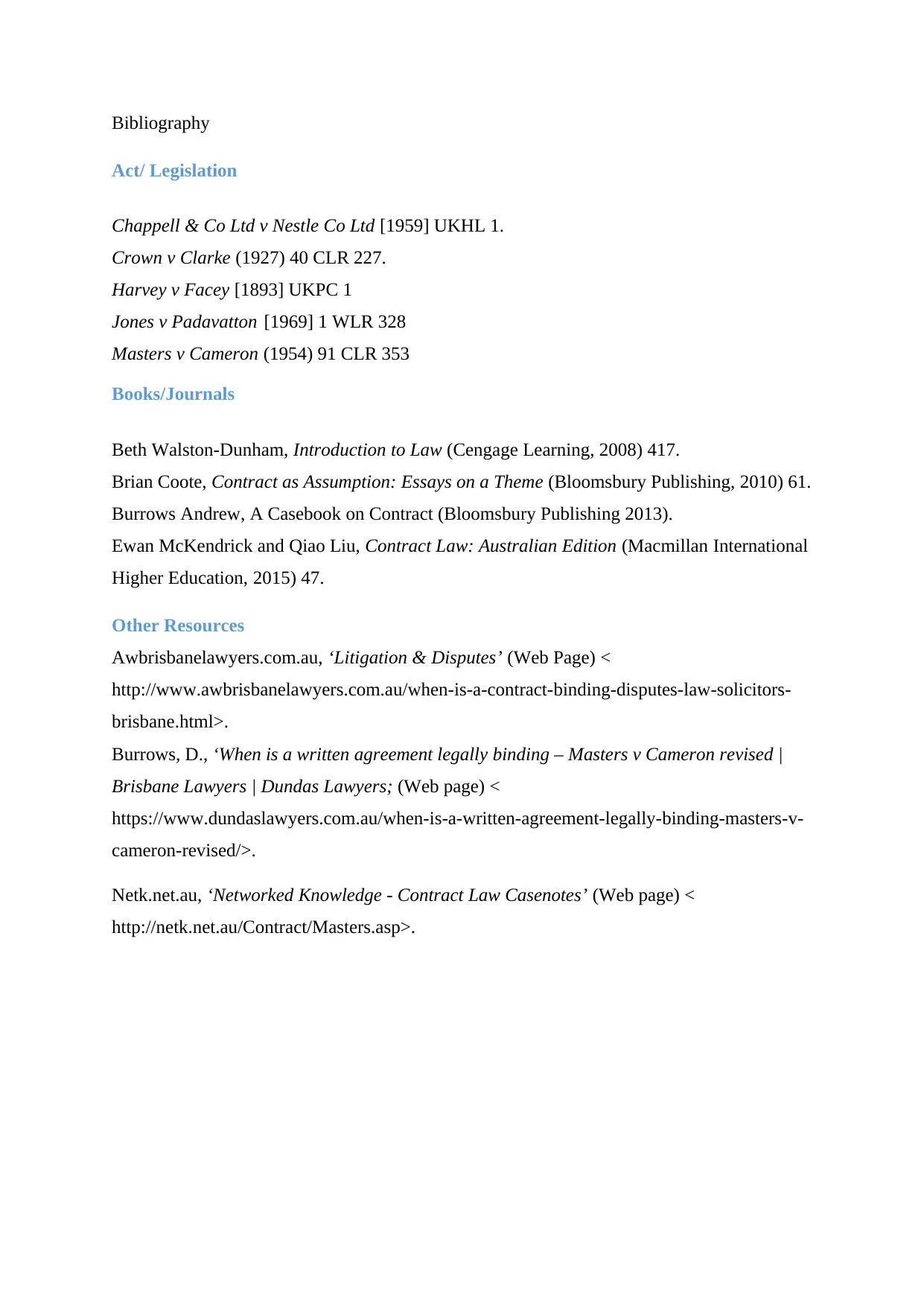
Bibliography
Act/ Legislation
Chappell & Co Ltd v Nestle Co Ltd [1959] UKHL 1.
Crown v Clarke (1927) 40 CLR 227.
Harvey v Facey [1893] UKPC 1
Jones v Padavatton [1969] 1 WLR 328
Masters v Cameron (1954) 91 CLR 353
Books/Journals
Beth Walston-Dunham, Introduction to Law (Cengage Learning, 2008) 417.
Brian Coote, Contract as Assumption: Essays on a Theme (Bloomsbury Publishing, 2010) 61.
Burrows Andrew, A Casebook on Contract (Bloomsbury Publishing 2013).
Ewan McKendrick and Qiao Liu, Contract Law: Australian Edition (Macmillan International
Higher Education, 2015) 47.
Other Resources
Awbrisbanelawyers.com.au, ‘Litigation & Disputes’ (Web Page) <
http://www.awbrisbanelawyers.com.au/when-is-a-contract-binding-disputes-law-solicitors-
brisbane.html>.
Burrows, D., ‘When is a written agreement legally binding – Masters v Cameron revised |
Brisbane Lawyers | Dundas Lawyers; (Web page) <
https://www.dundaslawyers.com.au/when-is-a-written-agreement-legally-binding-masters-v-
cameron-revised/>.
Netk.net.au, ‘Networked Knowledge - Contract Law Casenotes’ (Web page) <
http://netk.net.au/Contract/Masters.asp>.
Act/ Legislation
Chappell & Co Ltd v Nestle Co Ltd [1959] UKHL 1.
Crown v Clarke (1927) 40 CLR 227.
Harvey v Facey [1893] UKPC 1
Jones v Padavatton [1969] 1 WLR 328
Masters v Cameron (1954) 91 CLR 353
Books/Journals
Beth Walston-Dunham, Introduction to Law (Cengage Learning, 2008) 417.
Brian Coote, Contract as Assumption: Essays on a Theme (Bloomsbury Publishing, 2010) 61.
Burrows Andrew, A Casebook on Contract (Bloomsbury Publishing 2013).
Ewan McKendrick and Qiao Liu, Contract Law: Australian Edition (Macmillan International
Higher Education, 2015) 47.
Other Resources
Awbrisbanelawyers.com.au, ‘Litigation & Disputes’ (Web Page) <
http://www.awbrisbanelawyers.com.au/when-is-a-contract-binding-disputes-law-solicitors-
brisbane.html>.
Burrows, D., ‘When is a written agreement legally binding – Masters v Cameron revised |
Brisbane Lawyers | Dundas Lawyers; (Web page) <
https://www.dundaslawyers.com.au/when-is-a-written-agreement-legally-binding-masters-v-
cameron-revised/>.
Netk.net.au, ‘Networked Knowledge - Contract Law Casenotes’ (Web page) <
http://netk.net.au/Contract/Masters.asp>.
Paraphrase This Document
Need a fresh take? Get an instant paraphrase of this document with our AI Paraphraser

1 out of 11
Related Documents
Your All-in-One AI-Powered Toolkit for Academic Success.
+13062052269
info@desklib.com
Available 24*7 on WhatsApp / Email
![[object Object]](/_next/static/media/star-bottom.7253800d.svg)
Unlock your academic potential
Copyright © 2020–2026 A2Z Services. All Rights Reserved. Developed and managed by ZUCOL.




